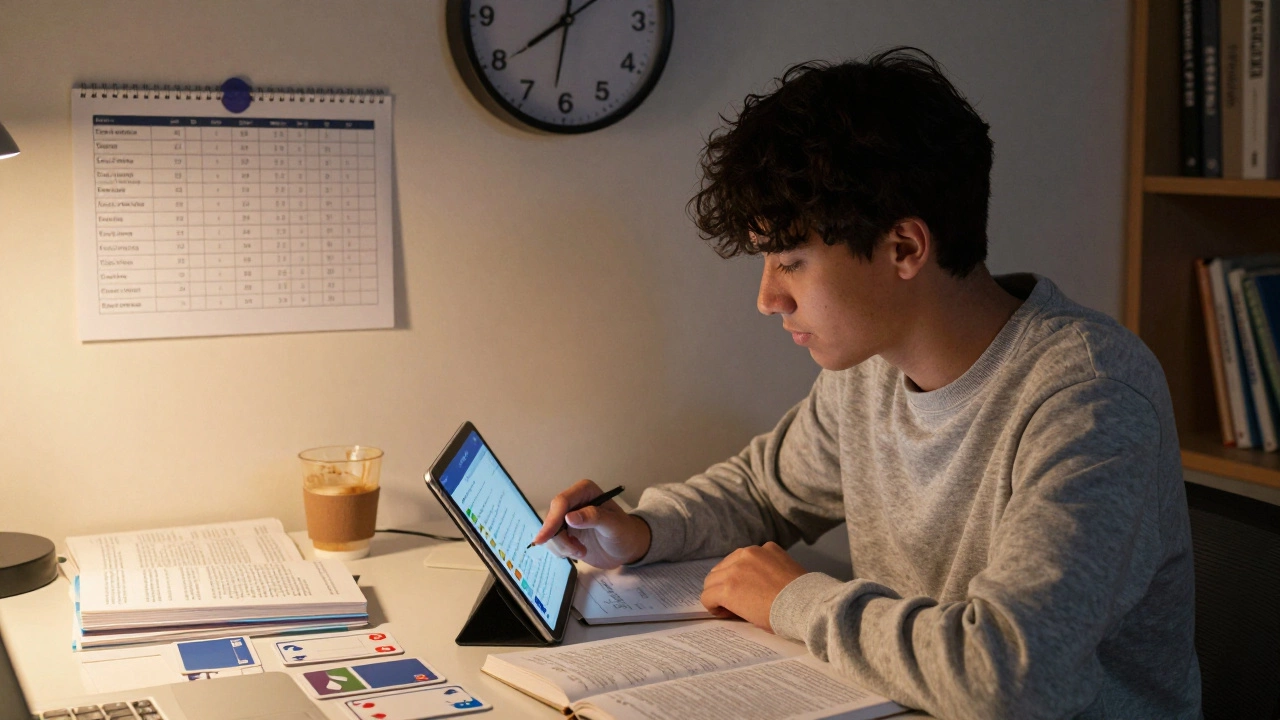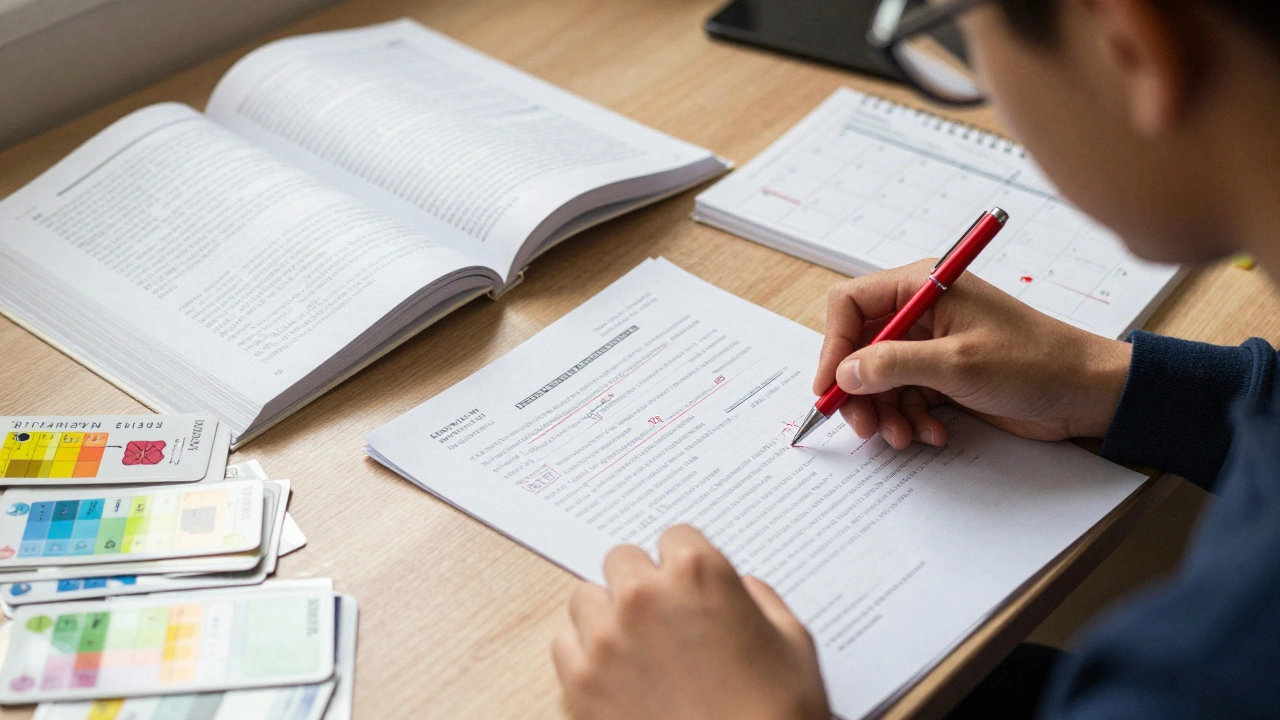GCSE Revision Made Simple: Practical Tips to Boost Your Scores
Staring at a pile of notes and wondering where to start? You’re not alone. Most students feel the pressure when exams loom, but a clear plan can turn chaos into confidence. Below you’ll find a step‑by‑step guide that works for any GCSE subject, plus quick hacks that fit into a busy schedule.
Set Up a Realistic Revision Schedule
First thing’s first: map out what you need to cover. Grab a planner or a digital calendar and block 30‑minute slots for each topic. Short, focused sessions beat marathon cramming because your brain stays sharp and avoids fatigue. If you have a week left, aim for three to four subjects a day, rotating to keep things fresh.
Don’t forget breaks. A five‑minute pause after each 25‑minute block (the classic Pomodoro technique) helps you retain information. Use that time to stretch, grab a drink, or glance at a fun video related to the subject – it resets your attention.
Active Revision Beats Passive Reading
Reading your textbook over and over feels safe, but it’s not the most efficient way to learn. Try these active methods:
- Teach it back: Explain a concept out loud as if you’re tutoring a friend. If you stumble, you’ve found a gap.
- Flashcards: Write a question on one side, answer on the other. Apps let you quiz yourself anywhere, and spaced‑repetition algorithms show you cards just before you’re about to forget.
- Past papers: The best way to know what examiners want is to practice with real questions. Time yourself, then compare your answers to the mark scheme. This also builds exam stamina.
One popular approach that many students swear by is the 2/3,5/7 study method. It breaks study time into three parts: 2 minutes of quick recall, 3 minutes of deeper explanation, 5 minutes of practice questions, and 7 minutes of review. The pattern forces you to move from passive to active use of the material.
If you’re aiming for a top grade, the article “How Hard Is It to Get a 9 in GCSE?” explains that achieving a 9 often means mastering exam techniques as much as content. Focus on keyword spotting, command words, and marking criteria. When you practice past papers, annotate the questions with these cues – it trains you to spot high‑scoring opportunities.
Finally, keep your study space tidy and free from distractions. A clean desk signals a clean mind. Turn off unnecessary notifications, and if you need background noise, low‑volume instrumental music works better than lyrics.
With a solid schedule, active revision tactics, and regular testing, you’ll walk into the exam room feeling prepared rather than panicked. Ready to start? Grab your planner, set the first 30‑minute block, and give one of the tips above a go. You’ve got this!
Is 3 Hours of Revision a Day Enough for GCSEs?
Is 3 hours of revision a day enough for GCSEs? The answer depends on how you use that time. Active recall, spaced repetition, and focused practice matter more than hours logged.
MoreIs 95% a 4.0 GPA? Understanding GCSE Grades and GPA Conversion
A 95% in GCSE is a top-grade performance, but it's not directly a 4.0 GPA. Learn how international universities interpret GCSE grades and what really matters for your applications.
MoreIs 3 Months Enough to Revise for GCSE? Here’s What Actually Works
Three months is enough to revise for GCSEs if you use the right strategy. Focus on active recall, past papers, and smart prioritization - not endless note-taking. Here's how to turn 90 days into real results.
MoreCan You Really Pass GCSE Without Revision? Honest Answers, Surprises, and Stats
Thinking of skipping revision for your GCSE exams? Here's exactly what happens, with honest data, real stories, and must-know facts to help you decide your next steps.
MoreBest Revision Technique for GCSE: What Really Works?
Struggling to choose the right revision technique for your GCSEs? This article reveals the most effective methods, from active recall to spaced repetition, with real tips you can use right now. Discover how the brain remembers information, and how to skip the traps of passive studying. Dive into straightforward advice whether you prefer flashcards, past papers, or group work. Make every revision hour count with proven approaches that actually work.
MoreIs 1 Month Enough to Revise for GCSE? Honest Truths and Real Strategies
Wondering if one month is really enough to get ready for your GCSE exams? This article breaks down what’s realistic, shares proven revision hacks, and unpacks the challenges students face with last-minute cramming. Learn practical ways to manage your time, spot common mistakes, and squeeze the most out of the weeks before your exam. Whether you’re starting late or just want to sharpen your plan, you’ll find tips that actually work here.
MoreHow Many Hours Should You Revise for GCSE? Practical Guide to Smart GCSE Revision
Wondering how much time you should spend revising for your GCSEs? This article breaks down the ideal number of hours, explains why quality matters more than quantity, and shares realistic schedules. Get smart tips for fitting revision into your life without burning out. Make your revision work for you, not against you.
More2 3 5 7 Revision Rule: Smarter GCSE Revision in Less Time
Sticking facts in your head for GCSEs isn’t about endless hours with a highlighter—it’s about timing your revision right. The 2 3 5 7 revision rule lays out a schedule to help your brain remember more with less stress. This article explains what the rule is, why it works, and how you can make it fit your actual revision habits. Get ready for straight-talking tips and easy ways to remember what matters most. No fluff, just smart study strategies.
MoreUnderstanding the 20 20 20 Rule for GCSE Revision
The 20 20 20 rule is a simple yet effective strategy designed to help students manage screen time and boost productivity during their GCSE revision. By encouraging regular breaks, this method aims to improve focus and protect eye health. With increasing screen use, this approach is more relevant than ever. Discover its benefits, practical tips to implement it, and how it can be combined with other study techniques for a balanced approach.
MoreUnveiling the 1/3, 5/7 Rule for Effective GCSE Studying
The 1/3, 5/7 rule is a strategic approach to study for GCSE exams. It helps students structure their revision time effectively by offering a balanced approach to learning. This method allows learners to maximize their retention and understanding of the material. By dividing study sessions into manageable chunks, students can avoid burnout and enhance their academic performance.
MoreMaster GCSE Success with the 2357 Revision Technique
The 2357 revision method is a strategic approach to studying that enhances knowledge retention for GCSE students. By organizing study sessions into specific durations and intervals, this technique optimizes learning efficiency. Students gain the advantage of structured revision, allowing for a deeper understanding of subjects. This method can be tailored to individual needs, making it a versatile tool for exam preparation. Discover how to integrate this method into your own study routine for maximum academic success.
MoreComparing Difficulty: UK Exams vs. US Tests
Education systems across the world vary widely in their approach to testing and evaluation. This article delves into a comparison between UK exams, such as the GCSEs, and their US counterparts, exploring the perceived levels of difficulty. It examines the structure, content, and student experiences related to these assessments. You'll find interesting insights into how cultural and educational differences shape these exams. The article also offers tips on how to prepare effectively for both types of evaluations.
More











